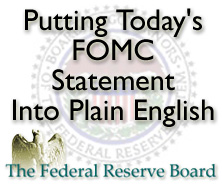What’s Ahead For Mortgage Rates This Week – August 24, 2015
 Last week’s economic events included a number of readings on housing related topics. The National Association of Home Builders released its report on builder confidence in housing markets, Housing starts reached their highest level since the great recession, and existing home sales exceeded expectations and the prior month’s reading. The Federal Reserve released minutes for its most recent FOMC meeting, which indicated that while a majority of FOMC members are leaning toward raising the Fed’s target federal funds rate, concerns over certain aspects of the economy continue to keep the Fed from citing a date for raising its target interest rate.
Last week’s economic events included a number of readings on housing related topics. The National Association of Home Builders released its report on builder confidence in housing markets, Housing starts reached their highest level since the great recession, and existing home sales exceeded expectations and the prior month’s reading. The Federal Reserve released minutes for its most recent FOMC meeting, which indicated that while a majority of FOMC members are leaning toward raising the Fed’s target federal funds rate, concerns over certain aspects of the economy continue to keep the Fed from citing a date for raising its target interest rate.
Home Builder Confidence Nears Highest Reading in 10 Years
The National Association of Home Builders reported its highest level of builder confidence in housing market conditions since November of 2005. August’s reading was 61 as compared to an expected reading of 59 and July’s reading of 60. Any reading over 50 indicates that housing market conditions are good. NAHB Chief Economist David Crowe said that August’s readings were consistent with builder expectations of gradual improvement in overall housing market conditions. Builder confidence in current market conditions rose by one point to a reading of 61; confidence in buyer foot traffic in new housing developments rose 2 points to 45 and the reading for expected home sales conditions over the next six months was unchanged at a reading of 70.
Builder confidence as shown by the three-month rolling average indicated that builder confidence increased by three points for a reading of 63 for the West; the Midwest also posted a gain of three points for a reading of 58. The South posted a two point gain in builder confidence for a reading of 63. In the Northeast, builder confidence held steady at 46.
Existing Home Sales Hit New Post-Recession High in July
According to the National Association of Realtors®, sales of pre-owned homes reached a new post-recession record in July. Sales of previously owned homes rose to a seasonally adjusted annual rate of 5.59 million sales as compared to expectations of 5.48 million sales and June’s reading of 5.48 million sales. Sales of existing homes have risen for three consecutive months and are 10.30 percent higher year-over-year. Higher home prices are helping homeowners move up to larger homes, but analysts said that first-time buyers are still struggling to buy due to strict mortgage requirements and high demand for homes.
Commerce Department: Housing Starts Higher, Building Permits Lower
The Commerce Department reported that June housing starts increased from 1.20 million in May to 1.21 million in June; this is a month-to-month increase of 0.20 percent. Economists had expected a dip in housing starts to a rate of 1.185 million on an annual basis. Single family housing starts rose by 12.90 percent to a seasonally adjusted annual rate of 782,000 starts.
Building permits slipped in July by 16.30 percent to an annual rate of 1.29 million permits issued. Permits for single family homes, which account for nearly 75 percent of permits issued, fell by 1.90 percent to an annual rate of 679,000 permits issued. Demand for multi-family homes such as condos and apartments is rising as would-be home buyers sit on the sidelines and many millennials prefer to rent. In spite of these factors the rate of building permits issued rose by 7.50 percent year-over-year.
Building permits issued rose by 7.70 percent in the South, and rose by 20 percent in the Midwest. In the West, permits issued declined by 3.10 percent in July, while the Northeast posted a decline of 27.50 percent in building permits issued. This was not a surprise as builders rushed to take out permits before a tax credit expired in June.
Mortgage Rates Mixed
Freddie Mac reported that average mortgage rates fell for fixed rate mortgages and ticked upward for 5/1 adjustable rate mortgages. The average rate for a 30-year fixed rate mortgage fell by one basis point to 3.93 percent. 15-year fixed mortgage rates fell by two basis points to 3.15 percent and the average rate for a 5/1 adjustable rate mortgage rose by one basis point to 2.94 percent. Discount points were unchanged across the board at 0.60 percent for 30 and 15-year fixed rates and 0.50 percent for 5/1 adjustable rate mortgages.
What’s Ahead
This week’s economic news includes the Case-Shiller 10 and 20 city home price index reports, FHFA’s house price report for home sales connected with mortgages owned by Fannie Mae and Freddie Mac, and pending home sales. Core inflation numbers will also be released; this is significant as the Fed has set 2.0 percent annual inflation as one of its indicators for raising the Federal funds rate. Freddie Mac’s survey of average mortgage rates and weekly jobless claims will be released on Thursday, and this week wraps up with the consumer sentiment report on Friday.

 If you’re in the process of simultaneously buying and selling a home, you may be in for the most stressful experience of your life. One UK-based real estate survey of over two thousand people found that buying and selling a house is more stressful than divorce, bankruptcy, a death in the family, becoming a parent for the first time, and even planning a wedding!
If you’re in the process of simultaneously buying and selling a home, you may be in for the most stressful experience of your life. One UK-based real estate survey of over two thousand people found that buying and selling a house is more stressful than divorce, bankruptcy, a death in the family, becoming a parent for the first time, and even planning a wedding! The minutes for the most recent meeting of the Federal Reserve’s Federal Open Market Committee (FOMC) suggest that while committee members won’t specify a date, a rate hike could come sooner than later. Committee members continue to cite concerns over labor markets and other economic factors, but the minutes of the FOMC meeting held July 28 and 29 indicate that a majority of members see a rate change as likely in the near term.
The minutes for the most recent meeting of the Federal Reserve’s Federal Open Market Committee (FOMC) suggest that while committee members won’t specify a date, a rate hike could come sooner than later. Committee members continue to cite concerns over labor markets and other economic factors, but the minutes of the FOMC meeting held July 28 and 29 indicate that a majority of members see a rate change as likely in the near term.